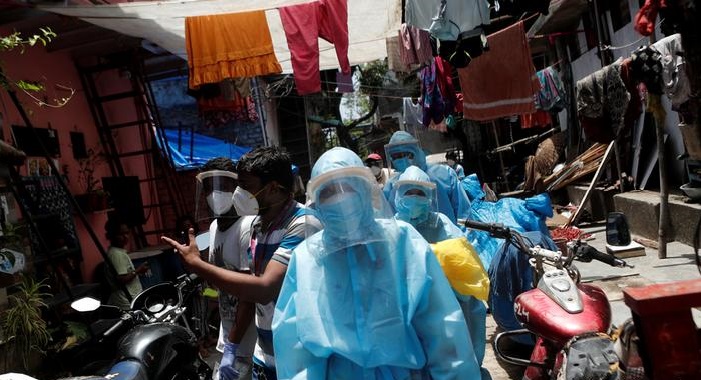
After Indian authorities reported over 11,500 fresh cases on Monday, COVID-19 infections in the South Asian nation rose to over 332,000, while related deaths surpassed 9,500.
India is now the fourth country worst-hit by the coronavirus pandemic after the US, Brazil and Russia.
Mumbai, Delhi, Chennai and Ahmedabad cities have seen a substantial spike in infections, accounting for nearly 130,000 COVID-19 cases and over 4,600 deaths.
India, which faces an uphill task to contain the COVID-19 spread, eased lockdown restrictions last month. Experts say the rise in coronavirus cases is due to an early relaxation of measures.
The grave situation prompted Prime Minister Narendra Modi to call an emergency meeting with his cabinet ministers over the weekend to review the country's coronavirus preparedness.
Home Minister Amit Shah also held a series of meetings with politicians in New Delhi and called for an all-parties meeting. The situation in Delhi is particularly dire as the government fears the COVID-19 cases could increase twenty-fold to more than half a million by the end of July.
Health system overburdened
"This situation is worrying. The pace of coronavirus transmissions in India is increasing, whereas it is declining in other parts of the world. The only good thing is that coronavirus patients are recovering faster, but there is no room for complacency," a senior health ministry official told DW on condition of anonymity.
Authorities admit that hospitals in five states – Maharashtra, Tamil Nadu, Delhi, Gujarat and Uttar Pradesh – will face an acute shortage of intensive care units and ventilators in the next months.
Health officials in Delhi and Mumbai are trying to install more COVID-19 treatment equipment in banquet halls, stadiums, hotels and school buildings in anticipation of more cases.
"Delhi will need at least 150,000 hospital beds by the end of July to treat COVID-19 patients coming from other states," Chief Minister Arvind Kerjriwal told a press conference.
Reports of citizens not getting admitted to hospitals have triggered panic in the country. Shahid Siddiqui, a lawmaker, recently said that his niece died of coronavirus after she was denied treatment at several hospitals in Delhi.
Lakhanjit Singh, a 68-year-old coronavirus patient, lost his life after six hospitals reportedly denied him admission.
India's financial capital Mumbai, which is now the coronavirus epicenter in India, has reported over 100,000 cases – more than the Chinese city of Wuhan, where the virus originated in December 2019.
"We are doing our best to cope with the situation," Iqbal Chahal, the head of Brihanmumbai Municipal Corporation (BMC) in Mumbai, told DW.
Has the virus peaked?
Experts believe the coronavirus has not yet peaked in India. According to a study by the Indian Council of Medical Research, the peak of the pandemic has been delayed because of the eight-week lockdown and could now happen in mid-November.
"The situation is grim only in some locations – mostly in densely populated cities. There are still many areas that have not been affected by the virus. Therefore, we cannot say that the whole country is badly affected by COVID-19," V K Paul, chairman of the national task force against COVID-19, told DW.
But experts say that with millions of migrant workers returning to their villages from big cities, the areas that have hitherto been spared by the virus could see a potential health crisis.
The western state of Rajasthan is already seeing a steady spike in COVID-19 cases. Similarly, the southern state of Andhra Pradesh reported about 1,500 cases in the last three weeks, of which about 500 cases were detected in rural areas.
India's rural areas lack a functioning public healthcare system, and with coronavirus gradually spreading to these locations, health experts predict a devastating scenario.
"India could have several coronavirus peaks. Every area in the country could have its own peak," Devin Narang, a health specialist, told DW.